Changmoo Kwan Family Tree

Grandmaster Byung-In Yoon
Founder of Changmoo Kwan
(1920 - 1983)

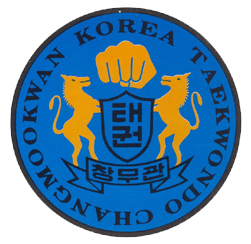
Changmoo Kwan
Founded in 1964
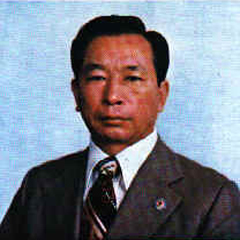
Grandmaster Nam-Sok Lee
First Instructor of Changmoo Kwan
(1925 - 2000)


Grandmaster Ri Kon Ko
Master Powell's Instructor
(1948 - )

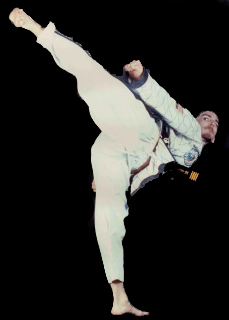
Master Rick Powell
Our Instructor
(1969 - )
Our Founder: Grandmaster Yoon

Grandmaster Byung-In Yoon
May 18, 1920 - April 3, 1983
Childhood
Grandmaster Byung-In Yoon was born on May 18, 1920, the middle of three sons born to Myong-Keun Yoon a local distillery owner in Mu-sun, Bong-Chon, Manchuria. His grandfather was Young-hyun Yoon, a government appointed Country Chief of the Tong-young and Gojae Island Districts, who was from the Yang Ban (Noble) class in South Korea, during the Yi Dynasty (1392-1910 A.D.). In 1909 however, the Japanese would invade Korea and take over the government forcing Byung-In Yoon's grandfather out of his position. Out of concern for his family's well being, Byung-In Yoon's grandfather moved his family to Manchuria to escape harm. Where at first the family fell into poverty, until Byung-In Yoon's father the oldest son of Young-hyun Yoon became owner of a distillery and brought the family great wealth.
Master Yoon began is studies at Shin-kyoung elementary school and later Youn-byun middle school. He was described as being exceptionally bright, kind, as well as quiet, and always wanting to help people, the trademarks of a true martial artist. It would also be noted that he was strong and when he had to fight, would never seriously hurt anyone, just do enough to make them quit. It was during his somewhat peaceful childhood that Byung-In Yoon would suffer an injury to his right hand that would later impact people. While huddling around a fire one winter, he was pushed, and stopped himself from being completely burned by way of his right hand, however the damage to his hand would involve him loosing have the length of his fingers. He would hide this by wearing white gloves in public and in later years while teaching classes. His students would later come to wear white gloves while training to show their respect.
It was while in elementary school that Master Yoon would begin his training in Chaun-Fa (Kung Fu) from a Mongolian master. At first the Master of the school would refuse to train him, do mainly because of Byung-In's Korean nationality (during this time period, Kung Fu masters refused to train foreigners). However Master Yoon would not give up, to show his dedication, he would sweep the porch outside the school and arrange the students shoes neatly in order. When the master came out of the school and saw what Master Yoon had done, he was impressed and welcomed Master Yoon in the school, and making Master Yoon the first Korean national to learn Chaun-Fa.
Adult Life
In 1938 after graduating high school, Master Yoon began studying Colonial Agriculture at Nihon University in Tokyo, Japan. At lunch time he would often be seen in the courtyard conditioning himself by hitting a large tree. The tree would eventually begin to lean do to the amount of abuse it took. It would also be during his college years that Master Yoon would be introduced to Karate. The introduction would be one of interest. Some of the Korean students on campus were allowed to join the Shudokan karate club taught by Master Toyama Kanken who was a 5th Degree Black Belt, which at that time was one of the highest ranks in Karate. One Korean student however would skip classes to spend time with his girlfriend. This would anger the Japanese karate students who would then chase the Korean student and beat him up. Before his next beating, the Korean student went to Master Yoon, knowing he had studied Chaun-Fa, and begged him for help. Master Yoon agreed, and at the next encounter with the Karate students, he would use his skills in Chaun-Fa to counter and dodge their attacks until they finally gave up and ran back to Master Toyama.
Master Toyama being an open-minded man and upon hearing what happened, invited Master Yoon to come speak with him about his non-karate way of fighting. Toyama himself had studied Chaun-Fa for seven years while in Taiwan and was very much interested in Yoon's background. The two agreed to exchange their knowledge of martial arts. Master Yoon would teach Toyama Chaun-Fa, and Toyama would teach Yoon Shudokan Karate. Master Yoon was welcomed into the Karate club and recognized as a 4th Degree Black Belt, making him the highest ranking student in the karate club. He was also made the team captain. He was also friends with General Choi Hong-Hi, when Choi was a student at the university, and the two would often train together on the roof tops in the city.

Shudokan Karate Master Toyama Kanken (Master Yoon's Karate Teacher)
In 1945 after Japan surrendered to the United States, thus ending World War II, Master Yoon returned home to Korea. He settled in the Chung-yang Rhee area of Seoul. He would have two important friends from the karate club that lived nearby Chung Sang-sup and Yoon Kwe-byung. Chung Sang-sup was the head of the karate club in the Cho-sun Yunmoo-Kwan Yudo School in Seoul, while Yoon, Kwe-byung was head instructor of the Jido-Kwan in Seoul. Chung would invite Master Yoon to teach Chaun-Fa and karate at the school. Master Yoon agreed and would do so for six months before he was invited to teach at the Cho-sun Central YMCA, he would later also teach at the Sung-Kyun Kwan University and Kyoung-Nong Agricultural College. He also would refuse an appointment as bodyguard to 1st Korean President Syng-mahn Rhee, one reason being to avoid embarassment at having to salute with his damaged right hand.
Master Yoon was also noted for being a hard teacher, when he began teaching at the YMCA in 1946 he had 500 students, however after several months that number dropped to 200 due to his "hardcore" method of training. At this time he called his system the Kwon Bup Bu which later come to be called Changmoo-Kwan.

Granmaster Byung-In Yoon (bottom center) with some of his students conducting "Summer Special Training" on Ranji-do Island in 1946
On January 15, 1949 Master Yoon married Yim Seung-duk, who on December 5, 1949 gave birth to Master Yoon's daughter Yoon Young-sook. Sadly though, he never really got to see his daughter.
Korean War and Later Years
In June of 1950, the Korean War would start. Master Yoon's older brother Yoon, Byung-du would show up in August of 1950 as a Captain in the North Korean Army and took Master Yoon to North Korea. During the November 25, 1951 talks between the United Nations and North Korea, Master Yoon was in a POW Camp on Gojae-do island. By way of an interview process, POWs were given a choice where to go, North or South Korea. Master Yoon chose the South. During the application process however he was jumped on by North Korean POW soldiers and prevented from leaving.
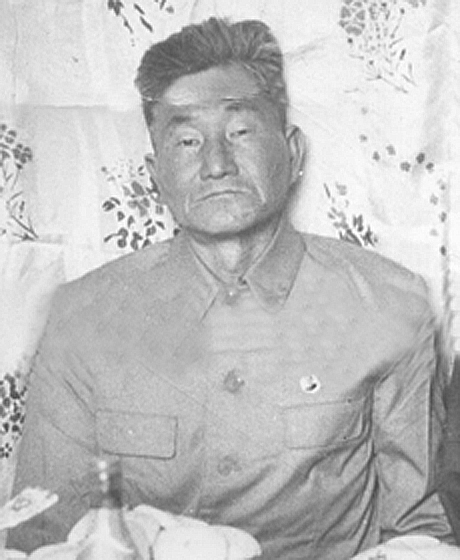
Grandmaster Byung-In Yoon on his 60th Birthday
Master Yoon's activities from 1951-1966 remain unknown. From January of 1966 to August of 1967 Master Yoon was appointed by the North Korean government sports commitee to teach Gyuck-Sul a "special combat system" to the Moran-Bong (North Korean Special Forces) in Pyong-yang, North Korea's capital. Master Yoon would marry again, this time to Rim Jeong-sook and have two children, a daughter in 1966 or 1967 and a son named Tae-won in 1968.
In December of 1967 the North Korean government cancelled Master Yoon's program stating that Gyuck-Sul wasn't a sport. Master Yoon was sent back home to work at a cement factory in Cheong-jin City, Ham-Gyoung North Province, where he continued to work until his death on April 3 1983 from lung cancer. He was 63.
Chang Moo Kwan
After Master Yoon went to North Korea in 1951 several of his students continued to teach in his absence. His two top students Master Nam-sok Lee and Master Soon-bae Kim were chief among them. Master Lee became the first official instructor in Kwon Bup Bu and continued to teach it at the YMCA until late 1950 or 1951 when the central building was destroyed by U.S. Warplanes. The school remained closed until 1952 when Nam-sok Lee moved it to a training space provided by the Postal Administration Department he used for his Cheshin-Bu Club. When the students moved to the club, Master Lee chose to change the name to Changmoo-Kwan (Brighten Martial Art School) which was a name that Master Yoon had mentioned to him while he was still living in South Korea. Master Lee would move the Changmoo-Kwan to the Mukyo-dong area in Seoul, then to the Kangmoo-Kwon Yudo dojang in the Kyungwoon-Dong area from 1958-1963.

Changmoo Kwan Symbol
On April 11, 1955 Nam-sok Lee would join with the other masters of the 8 major kwans (schools) in Korea uniting under the name of Taekwondo which had been coined by General Choi Hong-Hi. Master Lee would also help with the solidifying of the name by helping to form the Korean Taekwondo Association (KTA) in 1961.

Grandmaster Nam-sok Lee, the first instructor of Changmoo Kwan
In August of 2000 Master Nam-Sok Lee died at the age of 75. Grandmaster Soon Bae Kim became head of the Changmoo Kwan. Master Kim is also on the Kukkiwon Dan Promotion Committee. As a result of Yoon, Byung In's dedication and wonderful instruction, Chang Moo Kwan would later be one of the two main systems that would become chief in the founding of the World Taekwondo Federation in 1973.
Grandmaster Ri Kon Ko
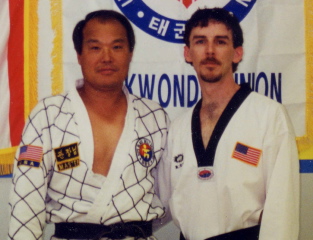
Master Powell with his instructor Grandmaster Ri Kon Ko
- 1987 U.S. National Team Ambassador for Martial Arts Summit, Seoul, Korea
- 1985 U.S. National Team Coach of Pan American Games, 1985.
- 1985-1983 Instructor of Kansas City Royals baseball organization-Larry Gura, Willie Wilson, and U.L. Washington
- 1980 Master Instructor of the Year Award, Martial Arts Times, magazine.
- 1979 Founder of Ko's Black Belt Academy, Independence, Missouri.
- 1977 International Referee, Third Annual World Tae Kwon Do Championship, Chicago, Illinois.
- 1979-1976 Instructor of U.S. Army General Staff College, Fort Leavenworth, Kansas.
- 1973 Captain of Yudo Martial Arts University Demonstration Team
- 1972 Demonstrator for the World Tae Kwon Do Federation
- 1970 Korean Army Tae Kwon Do Instructor. Viet Nam War (White Horse Division)
- 1969 Korean Army Tae Kwon Do Champion
- 1968-1965 Korean National Martial Arts Champion
- 1967 Korean Boxing State Champion
- B.S. Degree Adapted Physical Education, Korea Yudo Martial Arts University

